Discover the Rich Culture of Japanese Books at Alex Cooper Auctioneers | May 6 Auction
On May 6, Alex Cooper will sell a significant portion of the collection of Japanese books amassed by Lionel Katzoff, 1936-2022, a longtime Baltimore resident and docent at the Walters Art Museum.
Many art lovers are familiar with the single-sheet or triptych ukiyo-e (“floating world”) prints by artists such as Hokusai and Hiroshige, whose bright colors and novel compositions revolutionized European art in the late 19th century.
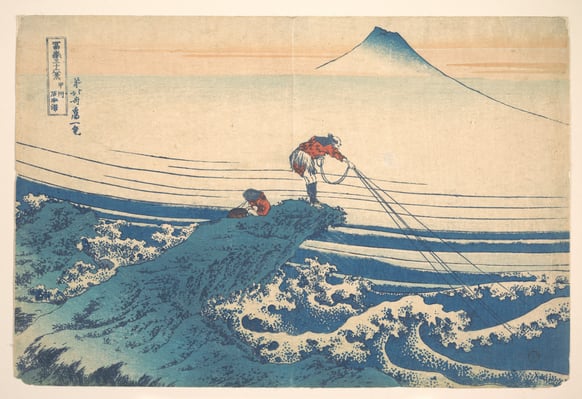
Katsushika Hokusai, Kajikazawa in Kai Province (Kōshū Kajikazawa), from the series Thirty-six Views of Mount Fuji (Fugaku sanjūrokkei) (Photo Credit: The Met, public domain)
One of Hokusai’s pioneering techniques was the use of Prussian blue pigment in his work. Known as aziome-e prints in Japanese, art that had Prussian blue in the color scheme stood out for their monochromatic beauty. Although Hokusai wasn’t the only ukiyo-e artist who used Prussian blue, he did help to popularise it through masterpieces like The Lone Fisherman at Kajikazawa in the Thirty-six Views of Mount Fuji series. It’s estimated Hokusai produced over 70,000 designs in his life and in terms of pure energy and innovation, there may be no greater ukiyo-e artist.
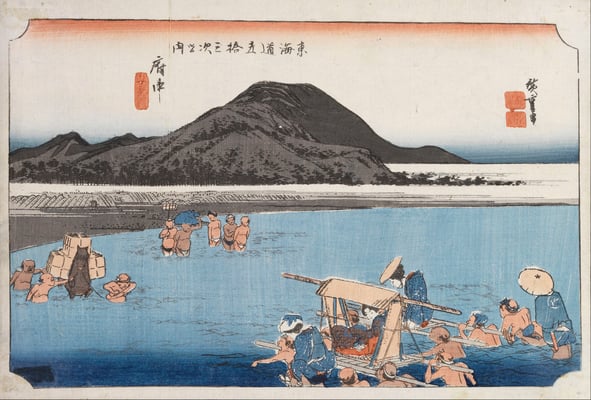
Ando Hiroshige, The Abe River Fuchu, from the series the Fifty-three Stations of the Tokaido (Photo Credit: Wikimedia Commons, public domain)
Hiroshige also earned a reputation for stunning landscape paintings, though he also produced a wide range of kabuki actor, women, and warrior portraits in his early years.
Less well known are the artist’s books and illustrated popular literature which were vital cultural traditions in 18th- and 19th- Century Japan. Katzoff was fascinated with these sorts of books, which have a special impact, turning from page to page.
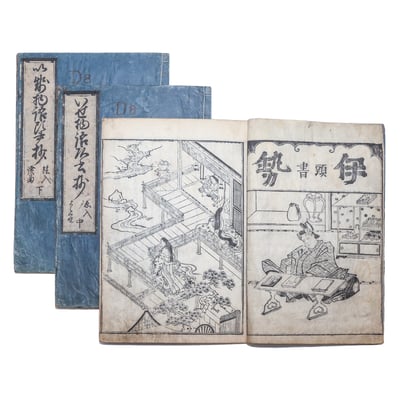
Lot 1342, Moronobu, Ise Monogatari, Japanese Woodcut Books
Less well known are the artist’s books and illustrated popular literature which were vital cultural traditions in 18th- and 19th- Century Japan. Katzoff was fascinated with these sorts of books, which have a special impact, turning from page to page.
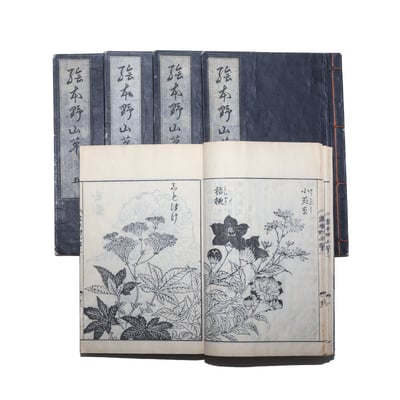
Lot 1354, Ehon Noyama Gusa, Set of Japanese Woodcut Books
Printed from carved wooden blocks, the pages were individually inked and colored, so that no two are exactly alike. Print runs were generally small, since these books were intended for a limited circle of artists and friends. In some cases, too, the government limited distribution and censored content which revealed too much about the outside world.
Among the lots to be sold are sketchbooks or mangwa by various artists, including students of Hokusai. They vividly illustrate daily life among common people.
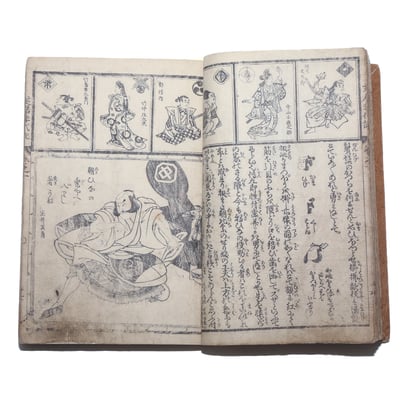
Lot 1346, Japanese Woodcut Book on Kabuki Theatre, 1811
Others contain contemplative studies of nature and landscapes. There are early novels, like an edition of ISE MONOGATARI, published in 1685; tour guides describing the sights and attractions in various provinces; an early history of the kabuki theatre; and an erotic shunga novel.
A Japanese doctor’s account of the foreign enclave at Deshima, near Nagasaki, contains enthusiastic images of telescopes and pumps, mermaids and strange humans, and sailing ships. Another set of books, giving a history of the Opium Wars, landed its author in jail for defying the censors, who restricted knowledge of the outside world.
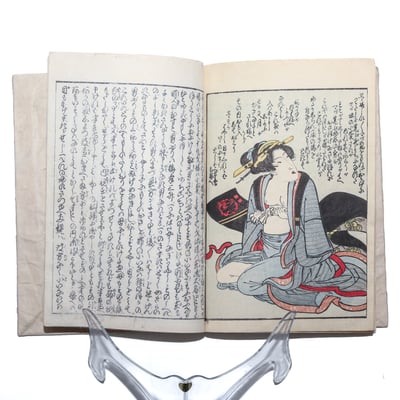
Lot 1349, Ehon Otsumari Sakazuki, Japanese Erotic Novel
This collection of hand-printed Japanese books was the subject of an exhibition, "Gathering Jewels," at the Walters in 2004. Proceeds from the sale will go to the Walters Art Gallery.
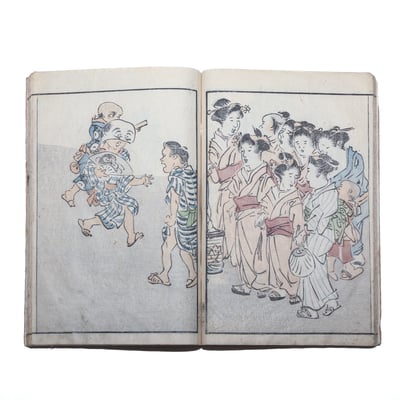
Lot 1376, Nantei Gafu Kohen, A Japanese Woodcut Book, c.1826
For a once-in-a-lifetime opportunity to explore the impressive collection of Japanese books amassed by Lionel Katzoff, 1936 - 2022. Learn about the unique culture and artistry behind these works while bidding on your favorite items at Alex Cooper Auctioneers.
Richard Hall

Specialist of Rare Books & Ephemera
Richard has over 30 years’ experience as a personal property appraiser, cataloguer, and auctioneer. At Alex Cooper from 2000-2015, in turns (and often simultaneously) he was cataloguer of silver, jewelry, coins, stamps, historical memorabilia including autographs and ephemera, firearms and edged weapons, ethnographic art, and books. Having taken some time away, he returned to Alex Cooper to assist with the Discovery Sales in early 2019. He is ready to take on the extra duties of cataloguing books and related materials whenever needed.